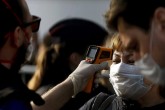The leaders of the world’s top 20 economies, called the Group of Twenty (G-20), met over video link Thursday to discuss the impact of the coronavirus. They pledged to do “whatever it takes” to stop the virus – their “common enemy.” Going forward, the G-20 will present a united front against the pandemic, working closely with the International Monetary Fund (IMF) and the World Health Organization (WHO).
The leaders also agreed to instruct their health ministers to finalize their plans for a presentation by April 20. They further pledged a $5 trillion cash injection into the markets to keep the global supply chain intact and prevent job losses, while stressing the importance of coordination among finance ministers and central bank chiefs.
During the videoconference, Turkish President Recep Tayyip Erdoğan urged fellow G-20 leaders to take immediate action, as the group did during the 2008 financial crisis. Recalling that even developed nations experienced serious difficulties in their fight against the coronavirus, he underscored the need to make financial aid available to countries coping with violent conflict and war and displaced persons, including Syrian refugees.
During the summit, world leaders accurately identified key steps to fight the virus outbreak, but unfortunately, it did not receive adequate attention. The G-20 leaders made major promises, but their words did not offer hope to a world dealing with a pandemic.
There were four reasons behind the world’s lack of interest. First, the top 20 economies, which control 80%t of all the world’s wealth, waited too long to formulate a joint response. The G-20 summit took place against the backdrop of four major disputes. Russia and Saudi Arabia are fighting a war over oil prices. The U.S. and China are engaged in a propaganda battle over the origins of the coronavirus. Although Donald Trump softened his tone, this is merely temporary. The virus’s spread dealt a heavy blow to the U.S., possibly jeopardizing the U.S. president’s chances of re-election. Therefore, Trump won’t stop saying that China is responsible for the virus outbreak.
Another problem is that the G-20 hasn’t taken enough concrete steps – despite using big words like “whatever it takes.” For example, each country discussed what steps they had taken to protect their national economy from the global recession. In other words, it seems that world leaders are still unable to grasp how seriously the pandemic will impact the rest of the world.
Thirdly, the G-20 leaders discussed the urgent needs of African nations, developing countries and refugees without formulating a common, global vision. The world’s leading economies are fixated on the virus’s impact on its own citizens. Yet there is no initiative in place to protect Syrians from the coronavirus who also fear Bashar Assad forces will resume attacks on Idlib. Nor does anyone wonder who will lead the effort to save refugees, stuck on Lesbos and regularly harassed by Greece, from the pandemic. We don’t even know whether the U.S. and the EU would deliver an effective response to a potential Russian bombardment in Idlib. There is no preparation for the virus’s likely spread in Africa or Latin America.
One could dismiss those concerns by saying that each country has to focus on its own problems in this time of uncertainty. Experts, however, warn that future outbreaks in conflict zones and less developed parts of the world could trigger second and third waves of global infection. One would have expected the G-20 leaders to take concrete precautions against that risk.
Finally, the coronavirus pandemic will clearly result in more serious damage than the 2008 financial crisis. Yet the U.S. refuses to lead the world this time around. Meanwhile, EU countries proved incapable of sharing their medical supplies and China cannot seem to go beyond public relations stunts.
Although the G-20 leaders summit failed to live up to the world’s expectations, global cooperation is still needed to allocate medical supplies, develop a vaccine and address the various side effects of the global recession. These needs won’t go away. If anything, they will become more and more obvious.
[Daily Sabah, 30 March 2020]



